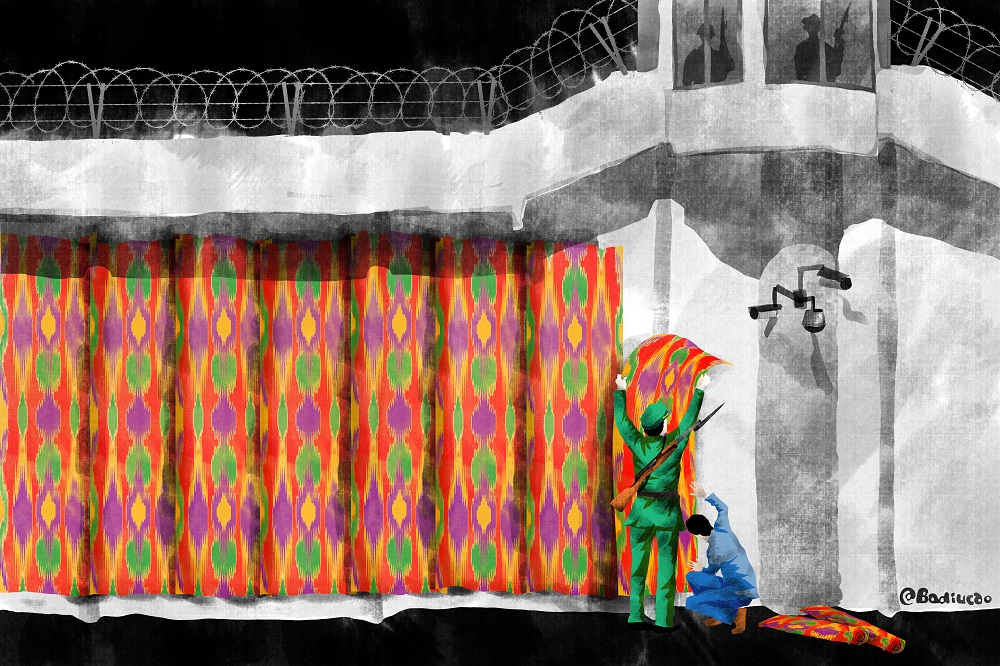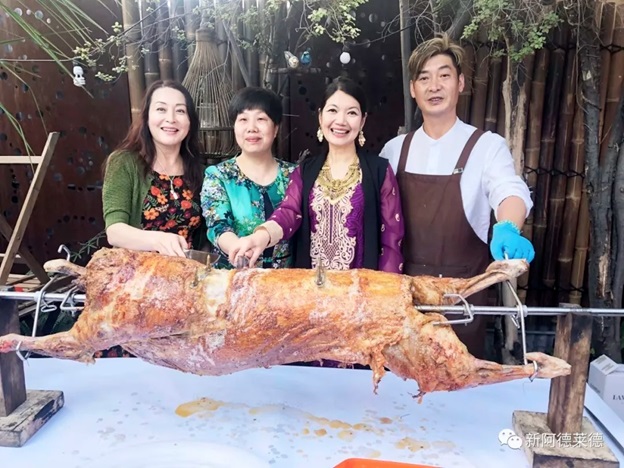Lin Li and James Leibold

Over the last decade the free world has watched the Chinese government’s brutal crackdown in the Xinjiang Uyghur Autonomous Region with growing alarm. Its use of mass extrajudicial interment, intrusive surveillance and coercive brainwashing has fundamentally altered the human and physical geography of the region and its indigenous Uyghur population. Yet the complex ways in which the Chinese Communist Party is exporting this repression abroad have received less attention.
Our new report, Cultivating friendly forces: The Chinese Communist Party’s influence operations in the Xinjiang diaspora, exposes how the CCP is actively monitoring Uyghurs living abroad, creating databases of actionable intelligence and mobilising community organisations in the diaspora to counter international criticism of its policies in Xinjiang while promoting its own interests abroad.
More than a million people with connections to Xinjiang now live in countries such as Kazakhstan, Turkey and Australia. This diasporic community is dominated by Uyghurs and other indigenous peoples but also includes a small group from the Han ethnic majority who formerly lived in or have links to Xinjiang. Many of these Han are part of the Xinjiang Construction and Production Corps, or Bingtuan for short, which settled millions of Han in Xinjiang and colonised the region in the name of the CCP.
Collectively, the Xinjiang diaspora is referred to as ‘overseas Chinese from Xinjiang’ by the Chinese government, regardless of their distinct identities as the colonised Uyghurs and the Han colonisers, or their cultural connections to the Uyghur homeland. By claiming to speak on behalf of ‘Xinjiang’ and its people, these CCP-aligned community organisations can neutralise—even silence—genuine criticisms of CCP policies in the region, while sowing fear, confusion and division not only in the Xinjiang diaspora but throughout the wider community. They actively foster a climate of plausible deniability that can cause foreign governments, politicians, corporate entities and civil society groups to ignore or discount the crimes against humanity being committed by the CCP in Xinjiang.
The Xinjiang diaspora is scattered widely across the world and its members are active targets of the Chinese government’s vast united front system: a complex network of decentralised party, state and civil society entities responsible for influencing people outside the CCP. United front work seeks to advance the CCP’s agenda, both domestically and abroad, by winning over friends and neutralising enemies. Under Chinese President Xi Jinping, united front work has increased in size, scope and strategic ambition.
The Chinese government and its united front agents are actively monitoring and harassing Uyghurs and other individuals and groups critical of its agenda. Amid this climate of intimidation, some overseas community groups with close ties to the CCP’s united front apparatuses are actively whitewashing the human rights abuses in the Uyghur homeland and even openly praising the party’s policies.
The CCP is also systematically collecting information on members of the Xinjiang diaspora and creating databases that could strengthen the party’s overseas surveillance and interference work. Party officials in Xinjiang have been building such databases—of former and current Xinjiang residents with overseas connections—since 1997. They collect detailed personal information, including ‘political inclinations and attitudes towards the motherland’ and ‘the methods and consequences of the efforts by hostile foreign forces to co-opt this group’, and then use that information to develop and influence strategies.
In our new report we present four case studies to pull back the veil on the activities of Xinjiang-linked community organisations in Canada, Australia, Central Asia and Turkey, and their ties to the CCP’s united front system. The full extent of their activities requires additional research and public transparency, and any policy responses will need to respond dynamically to the specifics of each situation. However, the starting point must be a more nuanced understanding of the CCP’s united front system: its aims, tactics, operations and global footprint.
Take the example of the South Australian Xinjiang Association in Adelaide. This small Han-dominated community organisation has strong backing from the China’s diplomatic mission and, until recently, local Australian politicians, who have openly praised the group for its contributions to Australian multiculturalism. The group regularly co-opts Uyghur cultural traditions (clothing, food, music) at their public events and claim to represent the diversity of both Xinjiang and Australian society despite the objections of Adelaide’s large Uyghur community—many of whom have relatives who’ve disappeared inside the dystopian ‘re-education’ system in Xinjiang.

Former presidents of the SA Xinjiang Association, Irena Zhang (far left) and Genargi Xia (far right) with South Australian MLC Jing Lee (second from right) and the Chinese Consul-General in Adelaide He Lanjing at an event welcoming the consul-general to Australia in December 2018 (source).
The group’s founder, Irena Zhang (Zhang Yanxia), has been involved with a prominent united front organisation, the Australian Council for the Promotion of Peaceful Reunification of China, which has come under intense scrutiny for foreign interference activities in recent years. On the CCP’s treatment of Uyghurs in Xinjiang, Zhang reportedly told a local newspaper: ‘In my opinion, I don’t think they are being mistreated.’
Another of the group’s former presidents, Genargi Xia (Xia Guanjun), has served as an overseas member for at least two united front bodies while its current president, Vivian Lim (Nian Wei), claims: ‘Xinjiang is a place where multiple ethnic groups lived since ancient times, where diverse cultures fuse and intersection…an environment where the sons and daughter of all ethnic groups coexist in mutual respect and harmony.’
Nominally independent community organisations like the SA Xinjiang Association are powerful resources in Beijing’s ongoing efforts to reshape the global narrative on Xinjiang, and they are making inroads. Look at the way some international leaders, including UN High Commissioner for Human Rights Michelle Bachelet and Kazakh President Kassym-Jomart Tokayev have recently echoed some of the CCP’s talking points on Xinjiang. We have plenty of examples of how the CCP is influencing—even corrupting and capturing—political elites abroad while seeking to ultimately control diaspora groups regardless of their nationality or political disposition.
Community groups like the SA Xinjiang Association may not be immediately recognisable as aligned with the CCP and its united front system. But our research demonstrates how the CCP actively cultivates these organisations and its leaders as conduits for advancing the party’s agenda abroad and, in turn, relegating or even silencing the voices of Uyghurs and other critics of its policies in Xinjiang. Their activities can mislead the public and could amount to foreign interference if properly exposed.
The CCP’s united front system employs a range of methods and tactics depending on local circumstances. In free and open countries, such as Australia and Canada, it exploits democratic institutions, civic participation and multiculturalism to create the false impression that Xinjiang is not that dissimilar to these societies and amplifies pro-CCP voices and narratives. In less open societies, such as Turkey, Kazakhstan and Kyrgyzstan, it exploits business and cultural links while leveraging the growing economic dependency of these countries on China.
Despite its abstruse nature, the party’s influence operations can be highly effective, especially when they go unnoticed and operate in a conducive environment. In countries where public scrutiny is possible because of, for example, a strong media and research community, the corrupting and corrosive nature of the CCP’s influence operations can be exposed, and short-term impacts can be counteracted if governments have set up appropriate operational and policy mechanisms to deal with such surveillance and foreign interference. Yet, in countries where democratic protections and transparency are lacking, such activities can quickly alter public opinion, exporting the CCP’s repression overseas and undermining domestic sovereignty.
The global rollback of open societies and democratic institutions leaves more dark shadows for the CCP’s united front agents to operate in and fewer opportunities to expose their pernicious effects. Under Xi, the CCP has doubled down on united front work and shown a willingness to properly resource its vast network so it can adapt and evolve in light of past successes and failures.
Our recommendations for policymakers, researchers and civil society includes a call for governments, law enforcement and civil society groups to more actively disrupt the CCP’s ability to interfere in sovereign countries and co-opt ethnic Chinese community groups and individuals through countermeasures such as enhanced public transparency, legislative reform, capacity building and law enforcement. Transparency is the best weapon for safeguarding the ability of citizens of all backgrounds to engage in public life free from outside interference and counteracting the hazards of the CCP’s united front system.
No comments:
Post a Comment